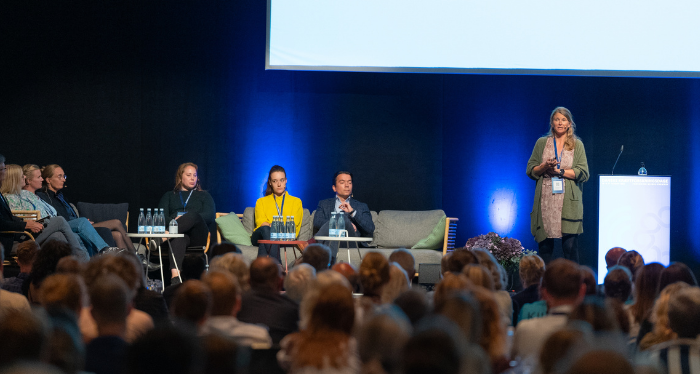
Under sessionen Aktuel dansk kræftforskning i rampelyset præsenterede syv forskere deres seneste forskningsresultater. DKD2021, Foto: Rune Borre-Jensen
24-11-21
When patients with cancer are treated with radiation therapy, it usually takes 4-5 minutes to give the right dose. But this causes considerable damage to the normal tissue. According to Brita Singers Sørensen, FLASH radiation can deliver the same dose in 0.5 seconds causing considerably fewer side effects.
FLASH radiation therapy is a new method with exciting perspectives, and it takes the same time as a blink of an eye.
“The tumour responds just as effectively, and the normal tissue is better preserved. The preliminary results are very promising. Many have been sceptical about the method, but so far it seems to have a really large potential”, says Brita Singers Sørensen, Novo Nordisk Foundation professor and employed at Danish Centre for Particle Therapy and Department of Experimental Clinical Oncology at Aarhus University Hospital, Department of Clinical Medicine, Aarhus University and DCCC Radiation therapy.
Huge potential but more knowledge is needed
In standard radiation therapy, the patient gets a small daily dose for 30 days. Using FLASH, the dose can be given in less than 0.5 seconds. Possibly, fewer treatment days are needed. FLASH seems to be equally effective, cause less side effects and make life easier for patients.
Brita Singers Sørensen and many other researchers see a huge potential in FLASH, but the method has not yet been adequately tested to be used to treat patients with cancer.
“Technically, we could treat patients, but we need better and more robust studies of the method before using it in the treatment of people”, says Brita Singers Sørensen.
In the United States, they have started to use the method in patients with terminal cancer when all other treatment methods have been tried. In this way, more knowledge is gathered of the method, which is not yet used in Denmark.
Currently, Brita Singers Sørensen is studying how mice react to FLASH radiation. She wants to establish that the same radiation dose given for less than 0.5 seconds has both the same effect on the tumour as standard radiation therapy as well as fewer side effects
A more basic understanding of the biological reactions is also needed. “What is the mechanism behind this? What happens biologically? I believe it is necessary to now this before applying the method in clinical practice”, she says.
Very much a team effort
Brita Singers Sørensen presented the FLASH method at Danish Cancer Research Days in August, and she was thrilled to have the opportunity to present her research to the 500 participants.
“It is a huge motivation to continue our work and it is very nice that researchers from other areas also think the perspectives are huge”, she continues.
“It is important for me to emphasise that this project is very much a team effort. The project could not be completed without the laboratory technicians, animal keepers and the entire team of highly competent physicists led by professor Per Poulsen, who have made all the basic research”, says Brita Singers Sørensen.
“Although the facilities are located in Aarhus, researchers also from abroad are also welcome to use the facilities at Danish Centre for Particle Therapy to run their tests. Even during the pandemic, three research teams from abroad have been visiting.
